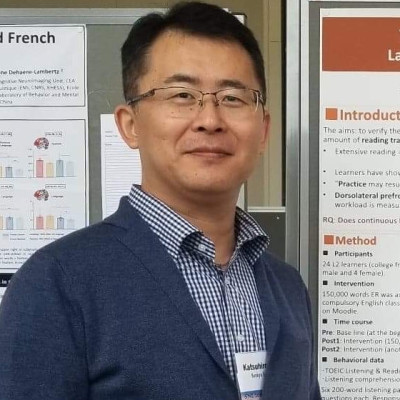Sessions / Location Name: Implementing ER
Physical Location
Location: 606
The Five-Finger Rule in Action: Do Thai EFL Learners Really Use It? #4246
The Five-Finger Rule is a widely recommended strategy for selecting appropriate reading materials in Extensive Reading (ER) programs, particularly for language learners using graded readers. This study investigates how Thai university students apply and perceive the rule, and how they implement it, using an online survey to collect data from 64 students participating in an ER program. Data on the number of books they assessed, the number of difficult words they encountered, and their reasons for choosing a particular book were gathered. The findings revealed that most students (53.8%) selected books that fell within the recommended difficulty range, aligning with their goal of a moderate challenge that still allows for comprehension. Interestingly, 13.8% of students intentionally chose books at a higher difficulty level, motivated by a desire to expand their vocabulary. These findings suggest that students adapt the Five-Finger Rule based on personal reading goals and language learning strategies.
Effect of Long-term ER on Productive Knowledge of High-Frequency Vocabulary #4030
Incidental vocabulary learning through ER has been examined for the uptake rate of new words learned, but ER also provides an opportunity to deepen knowledge of high-frequency words. This study examines the productive knowledge of high-frequency English vocabulary of Japanese university students of similar English proficiencies between those who have read over 430,000 tokens of ER and those with little or no ER experience. Subjects were tested on receptive and productive knowledge of the 2000 most frequent words of the NGSL (New General Service List) utilizing the testing application VocabLevelTest (McLean & Raine, 2019). ANOVA results showed a significant main effect of ER on productive vocabulary (p < .001, η² = .32), with similar effects observed for both NGSL 1-1000 and NGSL 1001-2000 word bands. These results suggest that ER contributes to strengthening productive knowledge of high-frequency words through repeated encounters in meaningful contexts, additional justification for curriculum integration of ER.
Implementing ER in a Tertiary Japanese Programme: A Case Study From NZ #4086
Research is lacking regarding implementing ER activities across an entire Japanese degree programme, including the feasibility of including ER from the students’ first semester of language study. This presentation will discuss how ER is being incorporated into six Japanese language courses, including from the first semester course, and what can be learnt from this trial. Major considerations included whether reading would be required or voluntary, what materials to use and how they would be provided to students, how much students would be expected to read, how to collect data, and how to determine whether they were indeed reading. We are collecting data regarding learner perceptions of attitude and language improvements resulting from doing ER, suggestions of the amount of reading that can be expected of students, as well as data regarding the pace at which they can increase their reading levels when engaged in ER over several years.
ER and Creative Writing: A Discourse-Based Approach to Student Narratives #4104
Extensive Reading (ER) is widely recognized for enhancing language acquisition, but its impact on creative writing and discourse agency remains underexplored. This study investigates how ER shapes storytelling, discourse patterns, and identity construction in an EFL Creative Writing course. Using Critical Discourse Analysis, it examines how ER influences students’ narrative structures, lexical choices, and gender representations in short stories. Students read ER texts before writing their own narratives, allowing for an analysis of intertextuality, discourse adaptation, and creative agency. Data is being collected from 6th- and 8th-semester university students, who began writing in February 2025. Preliminary findings suggest diverse discourse adaptation strategies, including intertextual borrowing, narrative transformation, and shifts in identity representation. The study explores how ER shapes students’ portrayals of social identities, including gendered discourse. Findings will provide insights into how ER fosters textual creativity, discourse awareness, and critical engagement, offering strategies for writing curricula integration.
Unleashing ULTRA: A Theory to Supercharge ER #4092
Extensive reading (ER) floods learners with meaningful language, but how do we ensure it sticks? This session introduces ULTRA—a Unified Linguistic Theory of Real Acquisition—a comprehensive, research-informed framework for how language enters brains and becomes fluent output. ULTRA identifies 16 core elements, including input, story-logic, addictive learning, output, fluency, elaboration, and more. After briefly overviewing ULTRA’s core, we will explore key elements that help teachers strengthen and vary their ER practice. We will examine prompts that help learners retell stories out loud (retrieval) and write short reactions or personal connections to what they read (elaboration). We will also consider gamification tools for tracking progress and recognizing achievements (addictive learning). Educators across levels will find actionable ways to lift ER’s impact—practical shifts, not grand fixes. Leave with a clear framework and effective strategies to help learners retain and enjoy ER more—ready to tweak your classroom tomorrow.
Getting Involved with ER Publications #4474
We welcome anyone currently involved, or who wants to become involved in extensive reading journals and newsletters to join this meeting. The roles and support for reviewers, editors, copy editors, layout editors, and website managers will be outlined at the meeting. We will also discuss the plans for the Proceedings for the Extensive Reading World Congress.
Implementing ER at a Middle School in China #4082
This presentation details the steps taken for implementation of a digital extensive reading programme at a private middle school in Beijing. In the school’s A1 cohort, one class took part in an ER trial for one semester, while others received traditional reading instruction only. The extensive reading group significantly outperformed comparison groups on internal reading examinations, and the programme was subsequently greenlit for 273 A1-B2 students. A student opinion questionnaire administered after one semester of whole-school ER showed strongly positive responses from the student base. Firsthand experiences including logistical and financial considerations are shared. The results showcase the viability of teacher-led ER programme pitches in large for-profit institutions.
Three Implementation Models for Extensive Reading in Chinese Young Learners #4383
Over the past five years, the importance of extensive reading (ER) has grown significantly in China. However, while many schools understand the benefits of ER, they often face challenges like lack of support from parents, students' busy schedules, and limited time, making it difficult to sustain these programs. In this session, I will share 3 models that how Chinese teachers implement ER for children aged from 5-12. The three models are Offline Home-Based Model, Offline Center-Based Model and Online Reading Camp. In each model, I will share one or two case studies.These cases will provide training school teachers who want to start ER good examples. They can learn how to integrate ER into their own courses, how to encourage parents to join in ER and how to set the goal for ER and so on.
Extensive Reading in India Today #4370
Using Extensive Reading (ER) for language teaching to ESL/EFL was propounded by Michael West in Bengal (undivided India) in the 1920s. He opined that reading vocabulary-controlled interesting texts was more effective than the existing methods to teach English to Bengali children who could access English only inside the school. In spite of its well-established benefits for developing proficiency, ER practices have steadily changed in the Indian context. This ongoing study reports on the current trends prevalent in India. Secondary data has been collected from research carried out in the Indian contexts over the years. Primary data has been collected by interviewing teachers and students about trends observed and problems faced. The information so far shows that ER continues to be used in India, and exists in the form of graded readers. However, the transition into online ER practices has not been reached, books are the preferred mode.
The Enlightenment of ER in a Vietnamese Public University #4443
This presentation first examines the current state of reading and especially extensive reading in the university context in Vietnam. This review shows that EFL reading classes in Vietnam almost exclusively teach reading intensively with little to no effort made to engage the students in systematic ER programs. We will then discuss the potential solutions to more smoothly implement an ER program in Vietnam by providing an example of one such ER program at our university. The particulars of our ERF supported ER program will then be explained followed by a review of its goals and achievements. In closing, we will propose some future steps we plan to take to not only embed ER more deeply into our curriculum, but mention ways to expand this model to other universities and schools in the region.
Extensive Reading Strategies Preferred by University Students #4390
This research aims to provide educational suggestions by analyzing extensive reading strategy preferences of Japanese university students. Extensive reading was incorporated in an English class to enhance their English proficiency. The students read books from the library for the first 20 minutes of every 90-minute class. Subsequently, a questionnaire was conducted with 16 students, employing a five-point Likert scale. The questionnaire was based on the top 10 principles proposed by Day & Bamford (2002), which were originally written for teachers but were modified in terms of students. As a result, the most favored principles were reading easy materials, choosing what they want to read and reading for general understanding. Although modeling is generally considered an effective learning strategy, the teacher as a role model of a reader was the second least favored principle. Finally, teachers should introduce those preferred principles earlier in class, creating a learning environment to realize them.
Challenges and Student Perceptions of a Type 5 Integrated ER Program #4480
This study explores student perceptions of the Type 5: Integrated Extensive Reading (ER) Program, a structured standalone ER course implemented in the English Education Department at the fourth-semester level. Unlike traditional ER, which focuses on reading for pleasure, this program integrates reading, writing critical reviews, focus group discussions, and presentations to enhance engagement. The research examines how students perceive its implementation, particularly regarding academic experience, workload, and skill development. By analyzing student feedback, the study identifies challenges, advantages, and overall reception of the Integrated ER approach. Using qualitative methods, including student reflections and discussions, it highlights how students navigate the program, their engagement levels, and perceived impact on learning. The findings offer insights into how structured ER programs are received in higher education and provide recommendations for improving implementation, ensuring that ER remains an effective and engaging approach to developing language proficiency and critical thinking skills.
ER and Vocabulary Development: Implicit and Explicit Classroom Methods #4093
The benefits of Extensive Reading (ER) for vocabulary development are well established in theory and research (Boutorwick et al, 2019; Suk, 2017; Webb and Change, 2015a and 2015b). ER is fundamentally an implicit approach to increasing reading rate, reading comprehension, and vocabulary size. As such its impact is not easily measured over short periods of time or without considering the role of many others types of L2 input for the learners. Vocabulary, on the other hand, can also be taught explicitly and measured for at least some forms of acquisition, quickly and easily. This presentation provides a model for combining both explicit and implicit methods of vocabulary learning, including use of the New General Service List, Vocabprofiler and diagnostic tests from Lextutor.ca, flash cards, structured review, and individualized quizzes to target high frequency vocabulary learning.


















